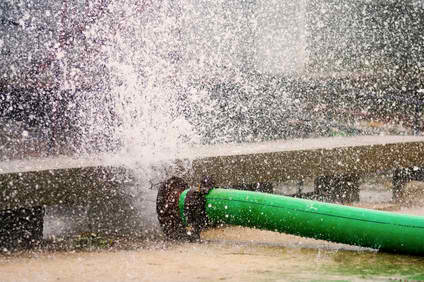
One of the worst mistakes a homeowner can make is to ignore the signs of impending plumbing chaos. If you’re experiencing plumbing problems such as water pressure that’s too high or too low, a flooded lawn, large indentations on the lawn, or persistent clogging, please, do not ignore the problem. Call us right away.
High and Low Water Pressure
High water pressure can damage the water heater, the pressure valve, wear away pipes, corrode rubber components, and can cause a rupture if a pipe is in a weakened condition. It can be an extremely costly avoidance! At this particular time in our state, the fines could be significant.
Pressure which is too low will not rush enough to cause damage, but it is an indication there may be a leak. If water pressure is coming in too low and slow, chances are you are losing water before it reaches the faucet you are trying to use. It can also make flushing the toilets difficult. If you notice low pressure, give us a call.
Dripping Faucets
Everybody at some point has experienced a dripping faucet whether at their own house, perhaps in a public bathroom, or even a friends house! Dripping faucets are bad for 3 reasons.
- It costs you extra money
- It wastes water
- It has a high chance of driving you crazy
Fixing a dripping faucet is usually a pretty simple fix, but your mileage may vary.
Slow Draining Sink
Slow draining sinks are usually a symptom of a blockage. There are a few ways to unblock a slow draining sink, such as:
- Using chemicals
Which may actually cause damage to your pipes, so use this as a last resort. There are some ‘home remedy’ typed recipes as well which are less harsh, such as baking soda and vinegar. - Using a plunger
It might seem a little bit silly to use a plunger on a sink, but sometimes that all it takes to clear the blockage. - Using a snake
Drain snakes are by far the most effective solution for drain cleaning.
Clogged Bath or Shower Drain
Similar to slow draining sinks, slow draining bath/shower drains are also caused by a blockage somewhere in your pipes. All 3 main solutions for fixing slow draining sinks can be used to fix a clogged shower/bath drain as well.
The plunger method is a great one to try before the others for tubs. You can put a thin layer of petroleum jelly around the drain so that the plunger can get a better grip, helping to clear the blockage.
Clogged Toilet
Hopefully, you’ve never been in that awkward situation of having to tell someone that their toilet clogged when you went to flush it. If your own toilet is clogged, there are a few easy steps to get it unclogged.
- Seems pretty simple, but try a plunger. It’s the easiest and arguably the quickest
- If that still didn’t work, and are feeling crafty, you can try some of the DIY methods that exist on the internet. Such as placing strips of packing tape over the toilet bowl to seal the air off. Most of these strategies won’t work, but hey. They might be worth a try.
- The absolute surefire way of unclogging a toilet is to use a snake. If you don’t have a snaking tool, you can pick one up at your home center/big box store, or hire a professional plumber to unclog your toilet for you.
Running Toilet
Is your toilet running? Well, you better go catch it! Haha we jest!
If your toilet is running, it’s almost always a pretty simple fix. It’s running due to a problem in the tank. There a few parts in there, such as the fill valve, the flapper, and the overflow pipe. Your fill valve may need to be replaced, your flapper chain may be too long, or your water level may be inaccurate. Whatever your problem may be, it isn’t too difficult of a fix.
Faulty Water Heater
If you hop in the shower or start washing dishes and your water is ice cold, you may be having a hot water heater problem. There’s really no way to say for certain what your water heater problem could be since it’s usually a semi-complex system. It could be anything from a pilot light that’s gone out, to a severely leaking expansion tank. If you’re experiencing water heater problems, you should contact a hot water heater repair specialist immediately.
Leaking Pipes
If you’re seeing water damage around your house, you need to act NOW. If you leave a leaky pipe go untreated, you run the risk of potentially thousands of dollars worth of damage (both cosmetic and structural).
If you have a leaking pipe, you need to detect where the leak is, access the leak, turn off the water, and then correct the issue. It’s also best to call in a professional to handle the leak as quickly and effectively as possible.
Our goal is to provide you with our best general advice possible on this site, and when you need us, to work fast, efficiently, and within your budget. We are here to help. Give us a call today at (877) 473-2566.

